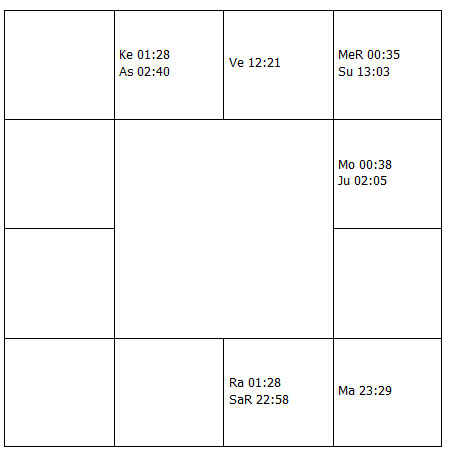 Religious Fanaticism is one of the four chaotic nodes which are affecting conditions of life on Earth at this time. By reference to conditions, we also refer to events and energy affecting the mind, pulling the mind and emotions down and leaving a bad taste in the mouth so to speak. In this article, we look to the chaotic node of religious fanaticism and how this appears in Vedic Astrology.
Religious Fanaticism is one of the four chaotic nodes which are affecting conditions of life on Earth at this time. By reference to conditions, we also refer to events and energy affecting the mind, pulling the mind and emotions down and leaving a bad taste in the mouth so to speak. In this article, we look to the chaotic node of religious fanaticism and how this appears in Vedic Astrology.
As the chaotic nodes of religious fanaticism, ecosystem collapse, corporate greed and manipulation and climate change grow momentum, expand of their own accord and multiply their effects by way of energy, it behooves us to explore these nodes and their effects on the human person. We look to Vedic Astrology to understand these effects.
Chaotic nodes, as we have shared earlier on this website, expand and grow - firstly as they are fed by human thought, feeling and action - thereafter, they expand and multiply of their own motion and energy. As we have shared earlier, the rise of water to a roiling boil makes it unpredictable to know when and where the next emergence of energy will be. Chaotic nodes are ever-expanding negative energy forms, free-floating around the Earth.
Fanaticism
The Oxford English Dictionary (OED) gives a first definition for fanaticism: the condition of being possessed, or supposing oneself to be possessed. Immediately following this definition, the OED tells that fanaticism - as used by the Ancients - had an original sense of apparition, the transporting of the mind. So the older sense of this word referred to the mind; the mind is taken, transported elsewhere. The mind is possessed. We have to ask ourselves, what is the agency that is causing this transport or possession of the mind to another place?
Apparition in its etiological sense as used by the Oxford Dictionary is a form of indulgence; one indulges or floods the senses with an idea, an experience, an expectation. Indulgence is a form of infatuation, and infatuation in Vedanta is one of the six enemies of man. Infatuation is the mind being taken over, possessed, as Oxford Dictionary tells above. So we may say that the psyche has been opened, broken, exposed, incised, torn open by infatuation, by apparition, by possession. Personal and inner boundaries collapse to allow an invader in, and are then built up again. The possession is intact.
Returning to the Oxford Dictionary, there are more dimensions of fanaticism explained:
- 2. Fanaticism - the tendency to indulge in wild and extravagant notions, especially in religious matters; viz, excessive enthusiasm, frenzy.
- 3. In a weaker sense, eagerness, enthusiasm in any pursuit: to infect with fanaticism, to render fanatical, to make a fanatic of, to infuriate.
Infuriate is an interesting word in the previous definition, for fanatics become furious in their pursuits. A person is said to go into a frenzy when enthusiasms get taken too far. One can be furious in faith, furious in fidelity and furious in propagation of their beliefs.
We draw a summary: a fanatic is a person possessed by something that has invaded their minds. The common-sense mind is taken elsewhere, transported as the dictionary tells, and what is left is a rake of thought and behaviour which is not managed by the intellect, the buddhi. What are fanatics possessed of? An idea, an infatuation, an apparition, an indulgence. We are left with an unreasoning enthusiast.
Enthusiasm, as C.S. Lewis explained, is en+theos = filled+God (or the Divine). In fanaticism, en+theos has been supplanted by another idea which does not brook the oversight of reason, nor common sense. So we can understand why the dictionary gives the definition, "unreasoning enthusiast". Fanaticism is found when a person is possessed, the mind supplanted or overtaken by a charismatic leader, a preacher, a teacher, a person who has successfully gained influence over another (i.e. - possessed the other). Whoever or whatever idea has "possessed" the person has exerted energy to enslave the mind and caused disconnection, and then reconnection to the object of infatuation, the object of one's adoration, worship, desires, etc. This might be a brotherhood, a sense of union and belonging. This may be a cause which ditches common sense and ordinary use of reason. In 1876, George Eliot told, "I call a man fanatical when he becomes unjust, unsympathetic to men (and women and children) who are out of his track".
It is clear that in fanaticism, the mind is possessed, thought lacks reason and common sense, behaviour is overzealous, old boundaries collapse and are rebuilt around whatever the mind is enslaved to - a new identity, a new belonging, latching onto a cause, furiously.
Astrological Reflections
The Moon - Chandra is the presiding deity of the mind, and the condition of the Moon and its placement in the chart is very important in Vedic Astrology. If the Moon is afflicted, then the mind is going to be weak, afflicted. There will not be strong boundaries nor strong inner self-control and discipline. There will be an inability to act with integrity - unity of thoughts, words and actions. The foundations of truth (satya) and right conduct (dharma) will be under threat.
Threats are also caused by malefic planets. The ninth house is reckoned as the house of religious affairs, beliefs and activities. A malefic planet in the 9th House or a malefic aspecting the 9th Lord will have a significant impact on healthy religion and common sense. If the 9th house from the Moon is similarly afflicted, then religious affairs will also suffer the same.
Religion in its original sense means "to bind", and religion binds culture. Culture is the foundation of society. There is claim that between the 9th House and the 4th House there is an antithesis between religion and culture, the 4th House being the house of ethnos, one's personal culture and environment. As the 4th is the 8th from the 9th, this is a dushtana house for religious affairs, and malefics here will affect harmonious relations between the self and the prevailing religious affairs of the culture. Yet others claim that Jupiter and Moon in Cancer (the natural 4th) give irrational faith. Other factors must be considered before we might reach such a conclusion. All minds are different, so all horoscopes are different. We look to the 6th House.
The 6th house is a dushtana house, and the house of fanatical ideas. It is also the house of service to humanity. If the mind is perverted (i.e., taken off its proper cause, possessed), then the service to humanity will have a dysfunctional focus and be service to a cause or an idea. If Mars is in the 6th House, there is willpower and drive to serve a cause.
The 6th House is also the house of sad-ripus, the causes of weaknesses that trouble all kinds of people. They are sometimes called enemies of man and comprise anger, lust, infatuation, jealousy, envy and greed. Planets here will be representing one or another of these weaknesses. In matters of personal health, malefics in the 6th are good; in matters of faults failings and weaknesses, planets here will exacerbate affairs. Ketu here will give illusions; Rahu in this house gives arrogance, conceit and extreme egoism.
There is some literature which says that Dhanus - Sagittarius can be the home of religious fanatics, as it is the natural 9th House of the horoscope. It may be aspected by a malefic - Mars has been mentioned - or occupied by a trika Lord, Lord of the 6th, 8th or 12th Lords. If this be the case, then other considerations would have to be taken into account for the possibility of religious fanaticism.
Role of Rahu and Ketu
Rahu in the 9th House causes one to change religious affiliation. Rahu in the 7th may cause one to hide one's religious affiliation, due Rahu's capacity for smoke and hiding things. Rahu is charakara, dispositor of fraud, so one may hold a purported religious affiliation and practice another.
Ketu can throw a native off-balance, for Ketu has no head. Ketu (according to some) has no drishti, and so Ketu has no specific direction in culture and society. Ketu of its nature withdraws to an inner world, and creates reality from there. So when we consider Ketu and ethnos (race, nation, people and culture) there can be a strong disconnection. Lack of direction in life, collapse of one's place in the society and culture and abandonment - whether in fact or in feeling and coupled with Ketu can lead to fanaticism of the religious kind. More research is needed in relation to Ketu and belief, for Ketu is frequently buried in a basement, and to get out of the basement (the darkness) into the light, a change of belief and experience are required.
Ketu, Culture and Society
One important issue with Ketu is that Ketu (headless) lacks discrimination. Direction in life is a critical issue. Direction in life is driven by values. Values guide choices, and behaviour is based on choices. Any exertion to action is exertion driven by a perceived good; perceived goods are identified by the values the native holds. Discrimination is necessary in order to find truth (satya) and right conduct (dharma) and to take action which is based on dharma and pulls one into the flow of Society.
Happiness and bliss are derived through contact with others.Divested of company and living in solitude is the fruit of fear and weakness and is not a sign of courage. The human is designed for company and association. Lively association produces morality, justice, compassion, equanimity, tolerance, Love and sympathy. Lively association toughens and trains character. Contempt of others does not produce any benefits to oneself. One gains through lively association and acquisition of sameness of beliefs, opinions and attitudes which lead to uplift and nobility in human society and culture.
The Caliphate
The Islamic State grew out of the Islamist terrorist group formerly known as the Islamic State in Syria (ISIS) and the Islamic State in the Levant (ISIL). A caliphate was proclaimed in June 2014, Abu Bakr al-Baghdadi — now known as Amir al-Mu'minin Caliph Ibrahim — was named as its caliph, and the group was renamed the Islamic State. It is an extreme group which became notorious for the videoed beheadings of American photojournalist James Foley, American journalist Steven Sotloff and Scottish aid worker David Haines.

The chart for the proclamation the Islamic State on 28 June 2014 (given above) shows Ketu is with the Ascendant. This illustrates an immediate disconnection with the world at large, and a drive to self-preservation. Malefic aspect is received from Mars in the 6th house, magnifying devotion to the cause. Moon and Jupiter are conjunct in the 4th House, both afflicted by exalted Saturn, 10th aspect. Mars in the 6th House provides willpower and drive to serve one's own causes. Saturn and Rahu in the 7th House afflict relations with the world, and due the rule Sani vat Rahu (Rahu behaves like Saturn) the effect of Saturn on the Ascendant is multiplied. Saturn also aspects the 9th house, Sagittarius. Ninth Lord is afflicted and conjunct the Moon in the 4th House. Rahu also afflicts Mars 12 houses away; a smokescreen is applied to the activities of Mars and service to humanity is now the bane of service to and advancement of the cause.
In the 9th Division (Navamsha) Lagna and Ketu are vargottama in Aries and joined by Saturn, further afflicting Ascendant and Ketu. Venus - guru of apara vidya (base knowledge, knowledge of worldly matters) is also in the Navamsha lagna and afflicted. Rahu and Mercury aspect from the 7th, and the message to the world is the mission of the Caliphate. Much is done in secret and illegitimately as Rahu is chalakaraka, dispositor of fraud, smoke and mirrors and breaks rules to further one's own cause and achieve goals at cost to all others. Moon and Jupiter are vargottama, making this conjunction much stronger and providing evidence for irrational faith.

![]()
